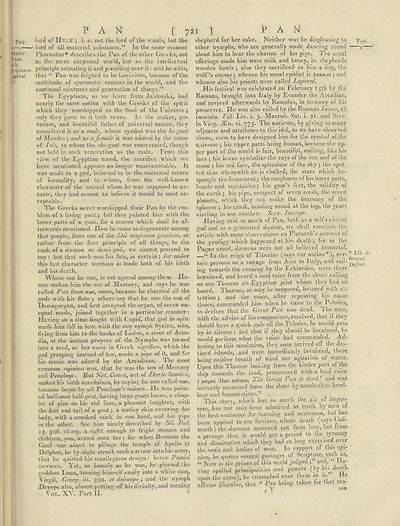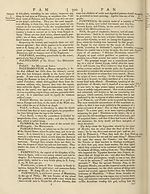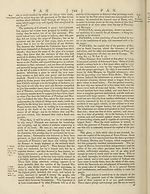Encyclopaedia Britannica > Volume 15, NIC-PAR
(799) Page 721
Download files
Complete book:
Individual page:
Thumbnail gallery: Grid view | List view

PAN [ 721 ] PAN
lortl of Hyle •, i. e. not the lord of the woods, hut the
lord of all material substance.” In the same manner
Pharnutus* describes the Pan of the other Greeks, not
as the mere corporeal world, but as the intellectual
principle actuating it and presiding over it: and he adds,
that “ Pan was feigned to be lascivious, because of the
multitude of spermatic reasons in the world, and the
continual mixtures and generation of things.”
The Egyptians, as we learn from Jablonski, had
nearly the same notion with the Greeks of the spirit
which they worshipped as the Soul of the Universe ;
only they gave to it both sexes. As the maker, go¬
vernor, and bountiful father of universal nature, they
considered it as a male, whose symbol was the he-goat
of Mendes j and as a female it was adored by the name
of Isis, to whom the she-goat was consecrated, though
not held in such veneration as the male. From this
view of the Egyptian creed, the sacrifice which we
have mentioned appears no longer unaccountable. It
was made to a god, believed to be the universal source
of fecundity, and to whom, from the well-known
character of the animal whom he was supposed to ac¬
tuate, they had reason to believe it would be most ac¬
ceptable.
The Greeks never worshipped their Pan by the em¬
blem of a living goat j but they painted him with the
lower parts of a goat, for a reason which shall be af¬
terwards mentioned. How he came to degenerate among
that people, from one of the Dii me jorum gentium, or
rather from the first principle of all tilings, to the
rank of a daemon or demi god, we cannot pretend to
say: but that such was his fate, is certain 5 lor under
this last character mention is made both of his birth
and his death.
Whose son he was, is not agreed among them. Ho¬
mer makes him the son ol Mercury, and says he was
called Pan from ttcsf, omne, because he charmed all the
gods with his flute 5 others say that he was the son of
Demogorgon, and first invented the organ, of seven un¬
equal reeds, joined together in a particular manner:
Having on a time fought with Cupid, that god in spite
made him fall in love with the coy nymph Syrinx, who,
flying from him to the banks of Ladon, a river of Arca¬
dia, at the instant prayers of the Nymphs was turned
into a reed, as her name in Greek signifies, which the
god grasping instead ot her, made a pipe ol it, and lor
his music was adored by the Arcadians. I he most
common opinion was, that he was the son of Mercury
and Penelope. But Nat. Comes, out of Duris Samms,
makes his birth scandalous, by saying he was called ttav,
because begot by all Penelope’s suitors. He was paint¬
ed half-man half-goat, having large goats horns, a chap¬
let of pine on hks red face, a pleasant laughter, with
the feet and tail of a goat} a motley skin covering his
body, with a crooked stick in one hand, and Ins pipe
in the other. See him nicely described by Sil. Ital.
13. 326. ct scq. a sight enough to fright women and
children, yea, armed men too lor when Brennus the
Gaul was about to pillage the temple ol Apollo at
Delphos, lie by night struck such a terror into his army,
that he quitted his sacrilegious design : hence Pamci
ierrores. Yet, as homely as he was, he pleased the
goddess Luna, turning himself easily into a white ram,
Virgil, Georg. u\. 392. et deinceps; and the nymph
Dryope also, almost putting off his divinity, and turning
Vol. XV. Part II.
shepherd for her sake. Neither was he displeasing to
other nymphs, who are generally made dancing round
about him to hear the charms of his pipe. The usual
offerings made him were milk and honey, in shepherds
wooden bowls ; also they sacrificed to him a dog, the
wolf’s enemy ■, whence his usual epithet is hvx.xio<; 5 and
whence also his priests were called Luperci.
His festival was celebrated on February 15th by the
Romans, brought into Italy by Evander the Arcadian,
and revived afterwards by Romulus, in memory of his
preserver. He was also called by the Romans Inints, ah
ineundo. Vid. Liv. i. 5. Macrob. Sat. i. 21. and Serv.
in Virg. iEn. vi. 775. The ancients, by giving so many
adjuncts and attributes to this idol, as we have observed
above, seem to have designed him for the symbol of the
u niverse ; his upper parts being human, because the up¬
per part of the world is fair, beautiful, smiling, like his
face 5 his horns symbolize the rays of the sun and of the
moon ; his red face, the splendour of the sky •, the spot-
ted skin wherewith he is clothed, the stars which be¬
spangle the firmamentj the roughness of his lower parts,
beasts and vegetableshis goat’s feet, the solidity of
the earth : his pipe, compact of seven reeds, the seven
planets, which they say make the harmony of the
spheres j his crook, bending round at the top, the years
circling in one another. Serv. Interpr.
Having said so much of Pan, both as a self-existent
god and as a generated daemon, we shall conclude the
article with some observations on Plutarch’s account oi
the prodigy which happened at his death ', for in the
Pagan creed, daemons were not all believed immortal.
“ In the reign of Tiberius (says cur anther*), cer¬
tain persons on a voyage from Asia to Italy', auo sail¬
ing towards the evening by the Echinodes, were there
becalmed, and heard a loud voice from the shore calling
on one Tliamus an Egyptian pilot whom they had on
board. Hhavnus, as may be supposed, listened vith at¬
tention ", and the voice, after repeating Ins name
thrice, commanded him when he came to the I clones,
to declare that the Great Pan was dead. The man,
with the advice.of his companions, resolved, that il they
should have a quick gale off .the Pelodes, he would pass
by in silence , but that il they should be becalmed, fie
would perform what the voice had comn-anded. Ad-
hering to this resolution, they soon arrived off the des¬
tined islands, and were immediately becalmed, there
being neither breath oi wind nor agitation ot, water*
Upon this Thamus looking from the hinder part of the
ship towards the land, pronounced with a loud \01ce
0 psyas n«v rdvriy.i, Phe Great Can is dead, anil itaS
instantly answered from the shore by numberless bowl¬
ings anil lamentations.” _ .
This story, which has so much the air of impos¬
ture, has not only been admitted as truth by men ot
the first eminence for learning and acuteness, but has
been applied to our Saviour, whose death (says Cud-
worth) the daemons mourned not from love, but from
a presage that it would put a period to the tyranny
and domination which they had so long exercised over
the souls and bodies of men. In support of this opi¬
nion, he quotes several passages of Scripture, such as,
“ Now is the prince of this world judged }” ar.el, “ Ha¬
ving spoiled principalities and powers (by his death
upon the cross), he triumphed over them in it. 1 e
affirms likewise, that “ Ran being taken for that rea-
4 Y s™
lortl of Hyle •, i. e. not the lord of the woods, hut the
lord of all material substance.” In the same manner
Pharnutus* describes the Pan of the other Greeks, not
as the mere corporeal world, but as the intellectual
principle actuating it and presiding over it: and he adds,
that “ Pan was feigned to be lascivious, because of the
multitude of spermatic reasons in the world, and the
continual mixtures and generation of things.”
The Egyptians, as we learn from Jablonski, had
nearly the same notion with the Greeks of the spirit
which they worshipped as the Soul of the Universe ;
only they gave to it both sexes. As the maker, go¬
vernor, and bountiful father of universal nature, they
considered it as a male, whose symbol was the he-goat
of Mendes j and as a female it was adored by the name
of Isis, to whom the she-goat was consecrated, though
not held in such veneration as the male. From this
view of the Egyptian creed, the sacrifice which we
have mentioned appears no longer unaccountable. It
was made to a god, believed to be the universal source
of fecundity, and to whom, from the well-known
character of the animal whom he was supposed to ac¬
tuate, they had reason to believe it would be most ac¬
ceptable.
The Greeks never worshipped their Pan by the em¬
blem of a living goat j but they painted him with the
lower parts of a goat, for a reason which shall be af¬
terwards mentioned. How he came to degenerate among
that people, from one of the Dii me jorum gentium, or
rather from the first principle of all tilings, to the
rank of a daemon or demi god, we cannot pretend to
say: but that such was his fate, is certain 5 lor under
this last character mention is made both of his birth
and his death.
Whose son he was, is not agreed among them. Ho¬
mer makes him the son ol Mercury, and says he was
called Pan from ttcsf, omne, because he charmed all the
gods with his flute 5 others say that he was the son of
Demogorgon, and first invented the organ, of seven un¬
equal reeds, joined together in a particular manner:
Having on a time fought with Cupid, that god in spite
made him fall in love with the coy nymph Syrinx, who,
flying from him to the banks of Ladon, a river of Arca¬
dia, at the instant prayers of the Nymphs was turned
into a reed, as her name in Greek signifies, which the
god grasping instead ot her, made a pipe ol it, and lor
his music was adored by the Arcadians. I he most
common opinion was, that he was the son of Mercury
and Penelope. But Nat. Comes, out of Duris Samms,
makes his birth scandalous, by saying he was called ttav,
because begot by all Penelope’s suitors. He was paint¬
ed half-man half-goat, having large goats horns, a chap¬
let of pine on hks red face, a pleasant laughter, with
the feet and tail of a goat} a motley skin covering his
body, with a crooked stick in one hand, and Ins pipe
in the other. See him nicely described by Sil. Ital.
13. 326. ct scq. a sight enough to fright women and
children, yea, armed men too lor when Brennus the
Gaul was about to pillage the temple ol Apollo at
Delphos, lie by night struck such a terror into his army,
that he quitted his sacrilegious design : hence Pamci
ierrores. Yet, as homely as he was, he pleased the
goddess Luna, turning himself easily into a white ram,
Virgil, Georg. u\. 392. et deinceps; and the nymph
Dryope also, almost putting off his divinity, and turning
Vol. XV. Part II.
shepherd for her sake. Neither was he displeasing to
other nymphs, who are generally made dancing round
about him to hear the charms of his pipe. The usual
offerings made him were milk and honey, in shepherds
wooden bowls ; also they sacrificed to him a dog, the
wolf’s enemy ■, whence his usual epithet is hvx.xio<; 5 and
whence also his priests were called Luperci.
His festival was celebrated on February 15th by the
Romans, brought into Italy by Evander the Arcadian,
and revived afterwards by Romulus, in memory of his
preserver. He was also called by the Romans Inints, ah
ineundo. Vid. Liv. i. 5. Macrob. Sat. i. 21. and Serv.
in Virg. iEn. vi. 775. The ancients, by giving so many
adjuncts and attributes to this idol, as we have observed
above, seem to have designed him for the symbol of the
u niverse ; his upper parts being human, because the up¬
per part of the world is fair, beautiful, smiling, like his
face 5 his horns symbolize the rays of the sun and of the
moon ; his red face, the splendour of the sky •, the spot-
ted skin wherewith he is clothed, the stars which be¬
spangle the firmamentj the roughness of his lower parts,
beasts and vegetableshis goat’s feet, the solidity of
the earth : his pipe, compact of seven reeds, the seven
planets, which they say make the harmony of the
spheres j his crook, bending round at the top, the years
circling in one another. Serv. Interpr.
Having said so much of Pan, both as a self-existent
god and as a generated daemon, we shall conclude the
article with some observations on Plutarch’s account oi
the prodigy which happened at his death ', for in the
Pagan creed, daemons were not all believed immortal.
“ In the reign of Tiberius (says cur anther*), cer¬
tain persons on a voyage from Asia to Italy', auo sail¬
ing towards the evening by the Echinodes, were there
becalmed, and heard a loud voice from the shore calling
on one Tliamus an Egyptian pilot whom they had on
board. Hhavnus, as may be supposed, listened vith at¬
tention ", and the voice, after repeating Ins name
thrice, commanded him when he came to the I clones,
to declare that the Great Pan was dead. The man,
with the advice.of his companions, resolved, that il they
should have a quick gale off .the Pelodes, he would pass
by in silence , but that il they should be becalmed, fie
would perform what the voice had comn-anded. Ad-
hering to this resolution, they soon arrived off the des¬
tined islands, and were immediately becalmed, there
being neither breath oi wind nor agitation ot, water*
Upon this Thamus looking from the hinder part of the
ship towards the land, pronounced with a loud \01ce
0 psyas n«v rdvriy.i, Phe Great Can is dead, anil itaS
instantly answered from the shore by numberless bowl¬
ings anil lamentations.” _ .
This story, which has so much the air of impos¬
ture, has not only been admitted as truth by men ot
the first eminence for learning and acuteness, but has
been applied to our Saviour, whose death (says Cud-
worth) the daemons mourned not from love, but from
a presage that it would put a period to the tyranny
and domination which they had so long exercised over
the souls and bodies of men. In support of this opi¬
nion, he quotes several passages of Scripture, such as,
“ Now is the prince of this world judged }” ar.el, “ Ha¬
ving spoiled principalities and powers (by his death
upon the cross), he triumphed over them in it. 1 e
affirms likewise, that “ Ran being taken for that rea-
4 Y s™
Set display mode to:
![]() Universal Viewer |
Universal Viewer | ![]() Mirador |
Large image | Transcription
Mirador |
Large image | Transcription
Images and transcriptions on this page, including medium image downloads, may be used under the Creative Commons Attribution 4.0 International Licence unless otherwise stated. ![]()
| Encyclopaedia Britannica > Encyclopaedia Britannica > Volume 15, NIC-PAR > (799) Page 721 |
|---|
| Permanent URL | https://digital.nls.uk/192592085 |
|---|
| Attribution and copyright: |
|
|---|
| Shelfmark | EB.11 |
|---|---|
| Description | Ten editions of 'Encyclopaedia Britannica', issued from 1768-1903, in 231 volumes. Originally issued in 100 weekly parts (3 volumes) between 1768 and 1771 by publishers: Colin Macfarquhar and Andrew Bell (Edinburgh); editor: William Smellie: engraver: Andrew Bell. Expanded editions in the 19th century featured more volumes and contributions from leading experts in their fields. Managed and published in Edinburgh up to the 9th edition (25 volumes, from 1875-1889); the 10th edition (1902-1903) re-issued the 9th edition, with 11 supplementary volumes. |
|---|---|
| Additional NLS resources: |
|

